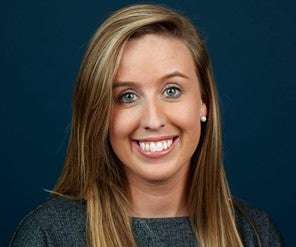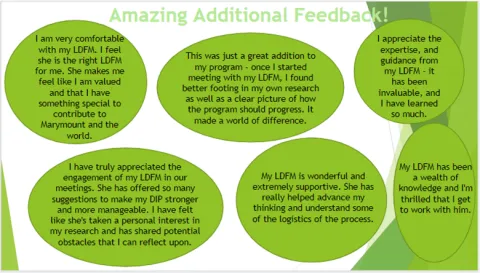Making the Match: The role of the LDFM in our Ed.D. Program

 We quizzed one of the LDFM Leadership Team members about the purpose of the LDFM program and the crucial role of the Lead Doctoral Faculty Mentor (LDFM) for Marymount University Ed.D. students. The role of the LDFM is to guide, mentor, and coach the Ed.D. students throughout the dissertation process. Here is what Dr. Jennifer Crystle had to say about the program, its offerings, and the framework it is built upon.
We quizzed one of the LDFM Leadership Team members about the purpose of the LDFM program and the crucial role of the Lead Doctoral Faculty Mentor (LDFM) for Marymount University Ed.D. students. The role of the LDFM is to guide, mentor, and coach the Ed.D. students throughout the dissertation process. Here is what Dr. Jennifer Crystle had to say about the program, its offerings, and the framework it is built upon.
First and foremost, what does the LDFM acronym stand for?
LDFM stands for Lead Doctoral Faculty Mentor. The role of the LDFM is to guide, mentor, and coach our Ed.D. students throughout the dissertation process.
Why do you believe the LDFM component is a defining element of the Marymount Ed.D. program?
The LDFM program is a unique asset to Marymount’s Ed.D. It is a program that fosters true mentorship, a community of support and scholarship, and really adds to that high-touch nature of our program that we pride ourselves on at Marymount. The LDFM is committed to walking through the dissertation journey with their mentees. Unlike the role of a traditional dissertation chair, our LDFMs are actively involved in the student’s process, providing coaching and encouragement from the development of their method all the way through to the final presentation.
What is unique about this role? What makes this different from a “dissertation chair”?
While a “dissertation chair” is the most common title given for this type of role, our LDFM role extends beyond the traditional role of a dissertation chair. Often dissertation chairs are full-time faculty members who may be randomly assigned to a doctoral student. Other times, students are left on their own to choose their committee and dissertation chair. These roles often do not have formal training or mentorship practices in place and there may not be a clear set of standards or expectations for the role. On the other hand, our LDFMs go through an extensive onboarding and training process so by the time they meet their student for the first time, they are well acquainted with the clear expectations, protocols, and guidelines associated with the role of “LDFM” to best meet the needs of their mentees. We outline clear expectations and standards of best practice for each semester, share an overview of what the students will be learning at the beginning of every semester, and provide ongoing professional development opportunities to help build the capacity and expertise of our LDFM community.
What was your experience getting your doctorate? How do you feel the role of the LDFM in conjunction with a scaffolded program improves the chance for student success and program completion?
My PhD program in Education Policy was structured very differently from Marymount’s Ed.D. program. I first took my coursework, comprehensive exams, and field exams, and after passing these components, I finally moved on to work on my dissertation research. I had a supportive dissertation chair and committee, but navigated much of the dissertation process independently. Work and life often stalled my dissertation progress, as I didn’t have coursework or faculty keeping me on track. I believe the way Marymount’s program is scaffolded is a fundamental component of student success and completion, as the dissertation process is embedded into their course assignments. This program design, combined with the layered support of the LDFM program, gives our students a significant advantage in earning the Ed.D., rather than falling into the ABD (“All But Dissertation”) category, which unfortunately happens for more than 50% of students in doctoral programs and 70% for students in online doctoral programs (Rigler et al., 2017).
How is the Ed.D. program scaffolded to support the relationship between the student and LDFM?
The LDFM supports our Ed.D. students over the course of four semesters, beginning in the second year of the program. As we touched on before, the process of writing the dissertation is strategically embedded into the Ed.D. coursework, rather than being an afterthought or “side project” that students are expected to tackle on their own. We strategically pair students with their LDFMs in Semester 4 prior to their Applied Methods coursework. This semester offers an opportunity for the LDFM and the student to get to know one another, discuss the student’s topic, and map out the dissertation journey ahead. Furthermore, the LDFMs and students have opportunities to attend many of the same virtual events together - from sync sessions, office hours, and virtual happy hours, to Write UP! Lab events, retreats, and seminars.
Talk to us about this selection process for LDFMs? Are LDFMs actually faculty within the university?
Over the past few years, we have prided ourselves in building a strong network of LDFMs. Through a rigorous vetting process, we identify distinguished scholars and practitioners who are leaders in their fields. Our LDFMs come from a variety of different backgrounds, including business, government, non-profit, and healthcare, which allows us to have a breath of evolving knowledge ready for our students to tap into. All of our LDFMs are onboarded as Marymount faculty and fully integrated into the Marymount community. We are proud to be continuously growing our network of LDFMs and integrating their expertise into our community, allowing us to meet the needs of our diverse and unique Ed.D. student population.
What is “Match Day”?
Match Day is like Christmas morning for our team! It’s an exciting day when the LDFM Leadership team gets together to find the best and most suited candidates for each of our Ed.D. students. Prior to this day, we gather some key information from the students regarding their topic, their method, and their working style to find a fitting LDFM match that has applied knowledge within the field the student is planning on studying. It’s a tedious process, but one we take a great deal of pride in because it adds to the personalized and high-touch nature of our program. We know a dissertation can be a daunting process, so we want our students to have the best match for that support as they embark on this journey.
Faculty often speak about the Ed.D. program’s alignment with CPED’s Guiding Principles. How does the LDFM program align with CPED’s ideals?
I’m glad you asked! Marymount is a proud member of the Carnegie Project on the Education Doctorate, which is a knowledge forum on best practices for the design and development of the Ed.D. CPED has a series of Guiding Principles, as well as design concepts to guide Ed.D. programs. Our LDFM program was proactively designed to encompass CPED’s best practices for mentorship at the foundation. At its core, the program values mutual respect, equity and inclusion, dynamic learning, empathy and flexibility, and individualized attention, among others. We are committed to continuous improvement of the program, which is another core tenet of CPED’s Framework.
How does Marymount go about providing ongoing support and training for the LDFMs?
Regardless of where the students may be in the dissertation process, we are committed to ongoing training, professional development, and community building for our LDFMs. As I’ve mentioned earlier, we have an extensive onboarding process where LDFMs are provided with an orientation to the program and LDFM responsibilities. Additionally, we offer live and recorded trainings every semester to ensure that LDFMs are best equipped to support students at that particular stage. All of our trainings and resources are housed in our LDFM Canvas site, so that we have a central and streamlined place for LDFM support. This Canvas site also offers discussion boards where LDFMs can ask questions and share experiences.
Lastly, we offer various touch points throughout the semester, including “First Tuesday Drop-in Sessions” and “Coaching Conversations.” These sessions allow for connection points where LDFMs can virtually pop-in to ask questions of our leadership team or share challenges and opportunities. Coaching Conversations offer specialized training on topics such as using coaching protocols and using backward planning to support students in the dissertation process.
What benefits have you seen emerge from the students working closely with their LDFMs?
So many! Students who work closely with their LDFMs typically have a better sense of the dissertation timeline, how to manage planning and goal setting, and generally are more motivated as they move through the different milestones and chapters of the dissertation. As an LDFM of six students myself, I am beginning to see some of my mentee’s “aha” moments and it has been really rewarding. They are each on their unique journeys, but they are beginning to find their voices as scholars, and I sense that they are more confident as they approach their coursework and dissertation assignments.

You are about to have your first cohort graduate from the program. What do you feel have been the biggest challenges now that you have 4 cohorts with LDFMs? How have you reacted to these challenges?
Our first cohort is a brave group of 30 individuals who put their trust in us and our program to support them through their coursework and the process of writing their dissertations. As the size of the cohorts continues to increase (our third cohort has over 70 students!), the biggest challenge has been growing our LDFM pool and finding distinguished scholars with diverse backgrounds to serve our students. We have students in our program whose professional fields range from education and healthcare to those in law, public safety, and nonprofit; therefore, it is our goal to find experts from these diverse backgrounds to ensure that we have matches that can speak to our students’ dissertation topics. With the growing pool of LDFMs, we have also had to continuously analyze and tweak our onboarding, trainings, and tracking protocols to ensure that we are supporting our LDFMs and, in turn, our students, to the best of our abilities. As you can imagine, there have been growing pains, but our team has really pulled together to field questions from LDFMs, troubleshoot technology challenges, and, at the end of the day, make every effort to ensure that our students feel supported, motivated, and encouraged.
Looking into the future, what role do you envision the LDFM “pillar” will play within the Ed.D. program?
As we look toward the future of our LDFM program, we are committed to continuous improvement. We are constantly looking for feedback from both our students and our LDFMs to improve the program and make it a positive, rewarding, and mutual learning experience for both students and mentors. Our goal is to continue building our LDFM community, as well as the robust LDFM training and resources.
"Supporting our students is our top priority, and we know that in order to best serve our students, we have to serve our LDFMs, allowing them opportunities to continue to grow and learn as mentors, from us and from each other.
Our hope is that our LDFM program will become a model dissertation mentorship program that will continue to elevate Marymount’s Ed.D. program and provide our students with the best possible experience as they earn their doctorate degree."
Learn More About Our LDFMs and Dissertation in Practice
References
Rigler Jr, K. L., Bowlin, L. K., Sweat, K., Watts, S., & Throne, R. (2017). Agency, socialization, and support: A critical review of doctoral student attrition [Paper presentation]. International Conference on Doctoral Education, University of Central Florida.
Carnegie Project on the Education Doctorate. (2019). CPED Framework: Mentoring and Advising.
